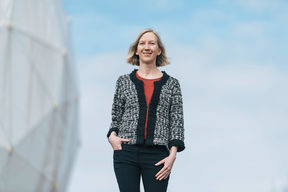Talvikki Hovatta wants to solve a mystery that has plagued astronomers for decades

Talvikki Hovatta has been awarded a European Research Council Consolidator Grant of €2.37 million. The five-year project will investigate relativistic jets launched by supermassive black holes, which have fascinated the scientific world for a century.
Relativistic jets are among the most extreme and energetic phenomena in the universe. They release huge amounts of energy during their existence, accelerating particles to higher energies than human-made particle accelerators could ever achieve.
Although relativistic jets have been studied for decades, their exact composition remains a mystery. Scientists do not know whether they consist of normal ionised gas, or a mix of matter and anti-matter. To solve the puzzle, the project will analyse the polarisation, or direction of light oscillation, of the light emitted by the jets. Funding from the ERC and a new state-of-the-art multi-frequency receiver at the Metsähovi Radio Observatory may finally provide an answer to this question.
‘The composition of relativistic jets is one of the biggest open questions in the field. The new receiver at the Metsähovi Radio Observatory and the large amount of observing time make our project unique worldwide,’ says Talvikki Hovatta, the project leader. Hovatta is currently a Research Council of Finland Research Fellow at the FINCA – Finnish Centre for Astronomy with ESO at the University of Turku and a visiting researcher at Aalto University.
The European Research Council (ERC) provides funding to leading researchers for pioneering work at the frontiers of science. Aalto University has been successful in these funding calls, where the sole criterion is scientific excellence. The Particle composition in relativistic jets (PARTICLES) project will start in 2025. Hovatta is looking forward to solving the problem of particle composition.
‘This kind of research funding will allow us to make real breakthroughs, and I look forward to seeing what new and perhaps surprising things we learn during the project’ says Hovatta.
Since 2011, Aalto has been awarded a total of 115 million euros in ERC funding for 73 different projects. Currently, there are 25 ongoing ERC projectsat Aalto University, with a total funding of 47 million euros.
More information
Talvikki Hovatta
talvikki.hovatta@utu.fi
Read more news

Design strengthens industrial competitiveness – human-centered factory work at the core
Factory work is undergoing a transformation: new technologies and artificial intelligence are changing the content and roles of work. Aalto University’s Department of Design is studying this change from a human-centered perspective in the HiFive project.
Learning to slow down: cold-water swimming benefits explored in new study
Swimming in cold water offers a temporal slowdown, promoting stress management and mental clarity that lingers long after the experience, says research from Finland.
The proxy server for remote access to e-resources is changing
If you have problems using e-resources, try accessing the e-resource using VPN connection.






